Editor:
Brandon Sweet
University Communications
bulletin@uwaterloo.ca
Waterloo observes the National Day for Truth and Reconciliation
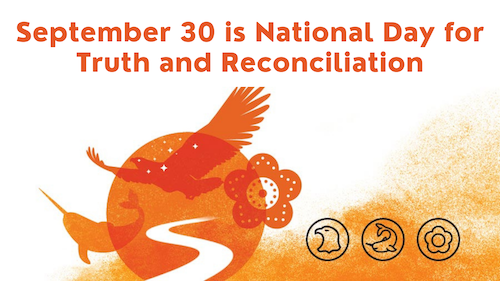
A message from Human Rights, Equity and Inclusion (HREI).
September 30 is the National Day for Truth and Reconciliation, a day that honours the lost children and survivors of the Indian Residential School System, as well as their families and communities. The National Day for Truth and Reconciliation also provides an opportunity for all Canadians to learn about and reflect on the legacy of residential schools.
The National Day for Truth and Reconciliation is a direct response to the Truth and Reconciliation Commission's (TRC's) Call to Action 80, which called for a statutory holiday of public commemoration. This holiday was created to ensure public commemoration of the history and legacy of residential schools remains a vital component of the reconciliation process.
The National Day for Truth and Reconciliation notably coincides with Orange Shirt Day, a day when we honour Indigenous children who were sent away to residential schools in Canada. This day relates to the experience of Phyllis Webstad, a Northern Secwpemc (Shuswap) from the Stswecem'c Xgat'tem First Nation (Canoe Creek Indian Band).
On her first day at St. Joseph's Mission Residential School, Phyllis Webstad wore a brand-new orange shirt that her granny had bought her. When she got to the school, she was stripped of her clothes and had them taken away from her, including the orange shirt. Phyllis never wore it again. "The colour orange has always reminded me of that and how my feelings didn't matter, how no one cared, and how I felt like I was worth nothing," says Webstad. "All of us little children were crying and no one cared."
Phyllis's orange shirt is now a symbol of the stripping away of culture, freedom, and self-esteem experienced by Indigenous children over generations. On September 30, all Canadians are encouraged to:
- Read: Start by reading the TRC’s 94 Calls to Action (PDF).
- Learn: Browse the Indigenous Initiatives Office resource pagefor more ways to learn.
- Reflect: How can you advance the TRC’s Calls to Action in your own spaces?
- Share: Share what you’ve learned with others and continue learning about Truth and Reconciliation in Canada.
Indigenous Initiatives gets a new (digital) home
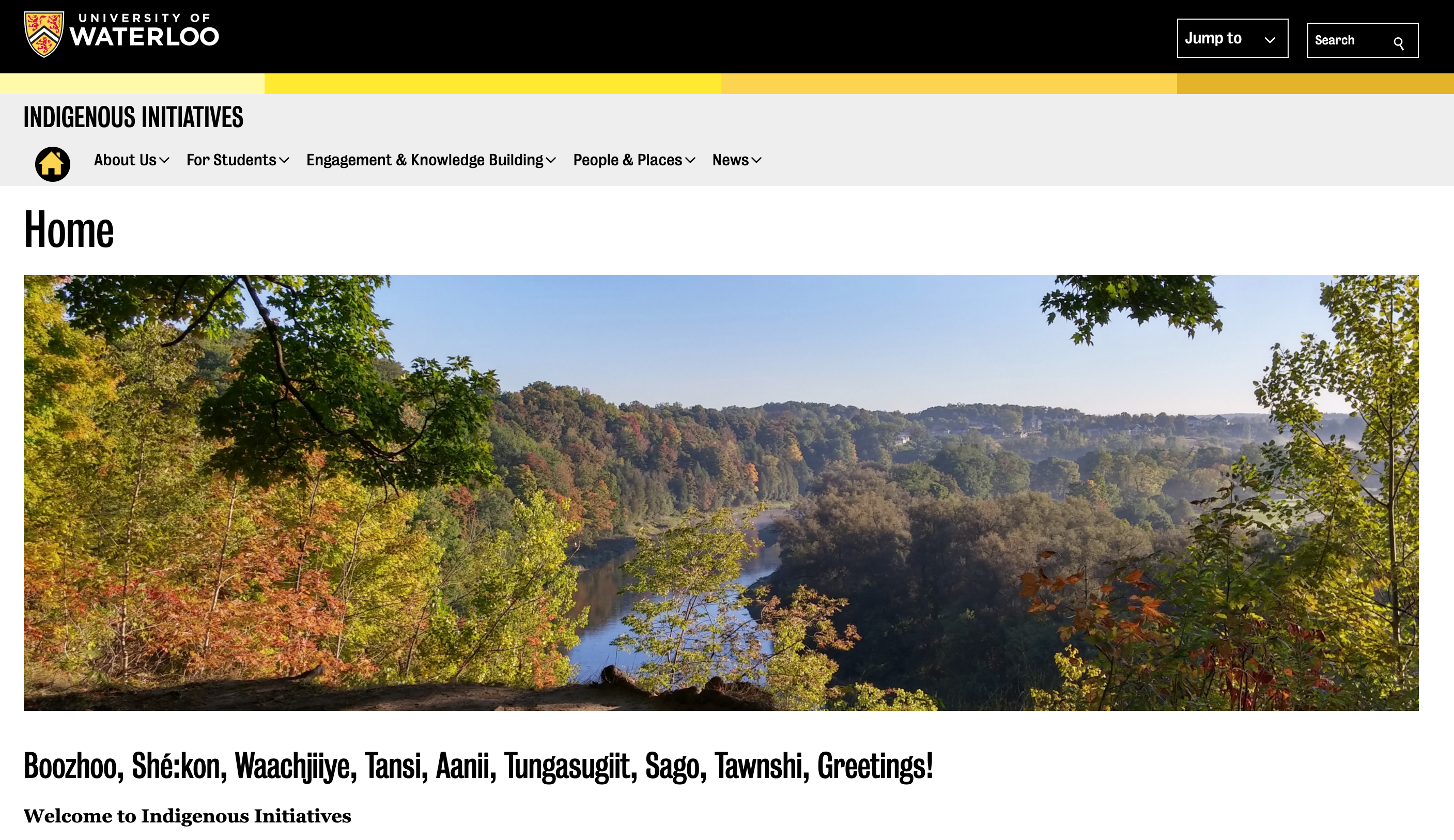
A message from the Indigenous Initiatives Office.
The Indigenous Initiatives office is launching a new website today. The site has updated resources, along with a new look and feel, taking full advantage of the new the Waterloo Content Management System (WCMS) launched this year. This comes on the heels of the launch of the new Indigenous Connections Newsletter, released last week. Campus community members can sign up to receive the seasonal newsletter.
The Indigenous Initiatives office encourages individuals to suggest additional resources and stories for the new site by emailingindigenousinitiatives@uwaterloo.ca.
In-person campus tours resuming for future undergraduate students
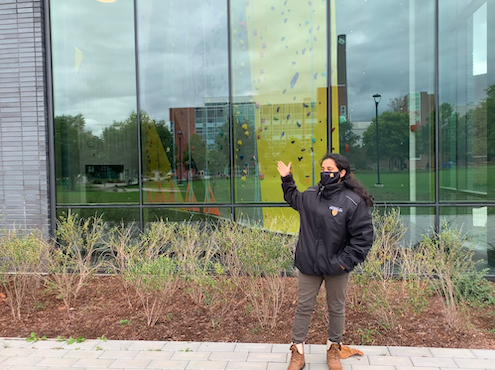
A message from the Visitors Centre.
The Visitors Centre is excited to be resuming in-person general campus tours for future undergraduate students. Tours begin October 4 and are available only through advanced booking due to limited capacities and enhanced safety protocols.
We are also looking forward to eventually resuming our full suite of tours including school group tours and faculty/college/school tours in 2022, as public health restrictions allow.
Our 90-minute campus tours are offered 3 times every weekday. While the tour is primarily outdoors, you may notice tour groups walking through the following buildings:
- South Campus Hall (SCH)
- Tatham Centre (TC)
- Centre for Environmental and Information Technology (EIT)
- Quantum Nano Centre (QNC)
- Student Life Centre (SLC)
- Village 1 general complex (V1) – no residence rooms will be shown
- St. Jerome’s University atrium (SJU)
In addition to resuming campus tours, the Visitors Centre will continue its ongoing work connecting with future students through virtual tours, calls, emails, online chats, and fulfilling brochure requests.
Q and A with the experts: Why any mask is better than no mask
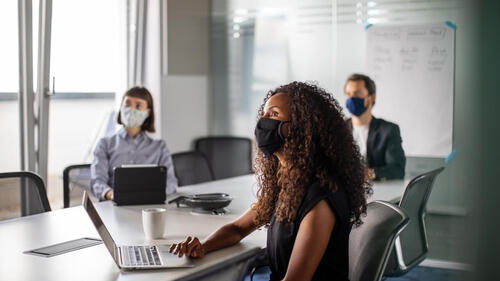
 As people return to offices and students to classrooms, masks are recommended indoors to limit the spread of COVID-19. Though N95 and KN95 masks offer the highest degree of protection, any mask is better than no mask. Serhiy Yarusevych, a professor in Mechanical and Mechatronics Engineering at the University of Waterloo and the principal investigator in the Fluid Mechanics Research Lab, explains how best to limit the spread of COVID-19 indoors.
As people return to offices and students to classrooms, masks are recommended indoors to limit the spread of COVID-19. Though N95 and KN95 masks offer the highest degree of protection, any mask is better than no mask. Serhiy Yarusevych, a professor in Mechanical and Mechatronics Engineering at the University of Waterloo and the principal investigator in the Fluid Mechanics Research Lab, explains how best to limit the spread of COVID-19 indoors.
As people start going back out to work, how important is it to continue wearing masks indoors? And do I need to use N95 and K95 masks?
It has been established that the SARS-CoV-2 virus that causes COVID-19 is transmitted by droplets produced during various expiratory activities, such as breathing, speaking, coughing, or sneezing. Consequently, any means of limiting the spread of droplets is of primary importance for controlling the spread of COVID-19. All types of masks are quite effective at capturing larger respiratory droplets. The masks also capture a portion of virus-laden aerosols exhaled by an infected person and inhaled by healthy occupants. This makes masking an essential component of COVID-19 mitigation indoors.
Although our recent research shows that the efficacy of capturing aerosols varies significantly based on mask type—with respirator masks such as N95 and K95 offering a significantly higher degree of protection compared to common cloth and disposable blue masks—all masks offer an added degree of protection.
If workers don’t have access to N95 and KN95 masks, what are the best practices to make cloth and disposable blue masks more effective?
The effectiveness of any mask depends on both the filtration capability of its material and mask fit to the face. The former aspect has been reflected in a revision of Public Health guidelines for non-medical masks, which now recommend the use of three-layer masks that incorporate a non-woven filter material. At the same time, since any mask only filters airflow that passes through the mask material, it is critical to ensure that the mask covers both your nose and mouth and forms a tight fit around your face. A poor mask fit can significantly reduce the effectiveness of even medical-grade masks. The appropriate mask donning procedure should ensure that your mask covers the nose, mouth, and chin, the elastic straps are adjusted to produce a tight fit around your face, and the nose-bridge wire is shaped for a tight fit. These steps should minimize any gaps between the mask and the face. A well-fitting mask should ensure minimal airflow around the nose bridge and cheeks, and the mask surface should visibly deform during normal breathing.
With schools resuming in-person classes, how best can children be protected who cannot wear masks or might not wear them correctly?
Social distancing, cohorting, masking, and ventilation are all important COVID-19 mitigation strategies, and they are most effective when combined. However, some measures, such as social distancing and appropriate masking, may be difficult to maintain or implement in various school settings, particularly with younger children. This places an added emphasis on the remaining viable measures. By replacing contaminated air with clean air or efficiently filtering out virus-laden aerosols, various ventilation methods can reduce the risk of virus transmission. For instance, our work showed that mechanical ventilation or high-efficiency particulate air (HEPA) purification can be more effective than most efficient masks in controlling aerosol build-up indoors. Thus, maximizing the existing ventilation capacity and supplementing it with air purification during occupancy periods reduces transmission risk and can be used to offset the negative impact of incomplete masking. Added benefits can be gained from limiting class occupancy during breaks and further enhancing ventilation through opening windows and doors when possible.
Serhiy Yarusevych is a Professor in Mechanical and Mechatronics Engineering and is the principal investigator in the Fluid Mechanics Research Lab. His research interests lie in the general area of fluid dynamics and aerodynamics.
Thursday's notes
 Food Services is reporting that all campus Tim Hortons location will be supporting for Orange Shirt Day and the National Day of Truth and Reconciliation.
Food Services is reporting that all campus Tim Hortons location will be supporting for Orange Shirt Day and the National Day of Truth and Reconciliation.
From September 30 to October 6, 100 per cent of the proceeds for the Orange Sprinkle Donut will go directly to the Orange Shirt Society and the Indian Residential School Survivors Society.
You can call ahead for larger orders:
- SLC: ext. 37829
- DC: ext. 39588
- SCH: ext. 36081
For more information, contact UW Food Services.
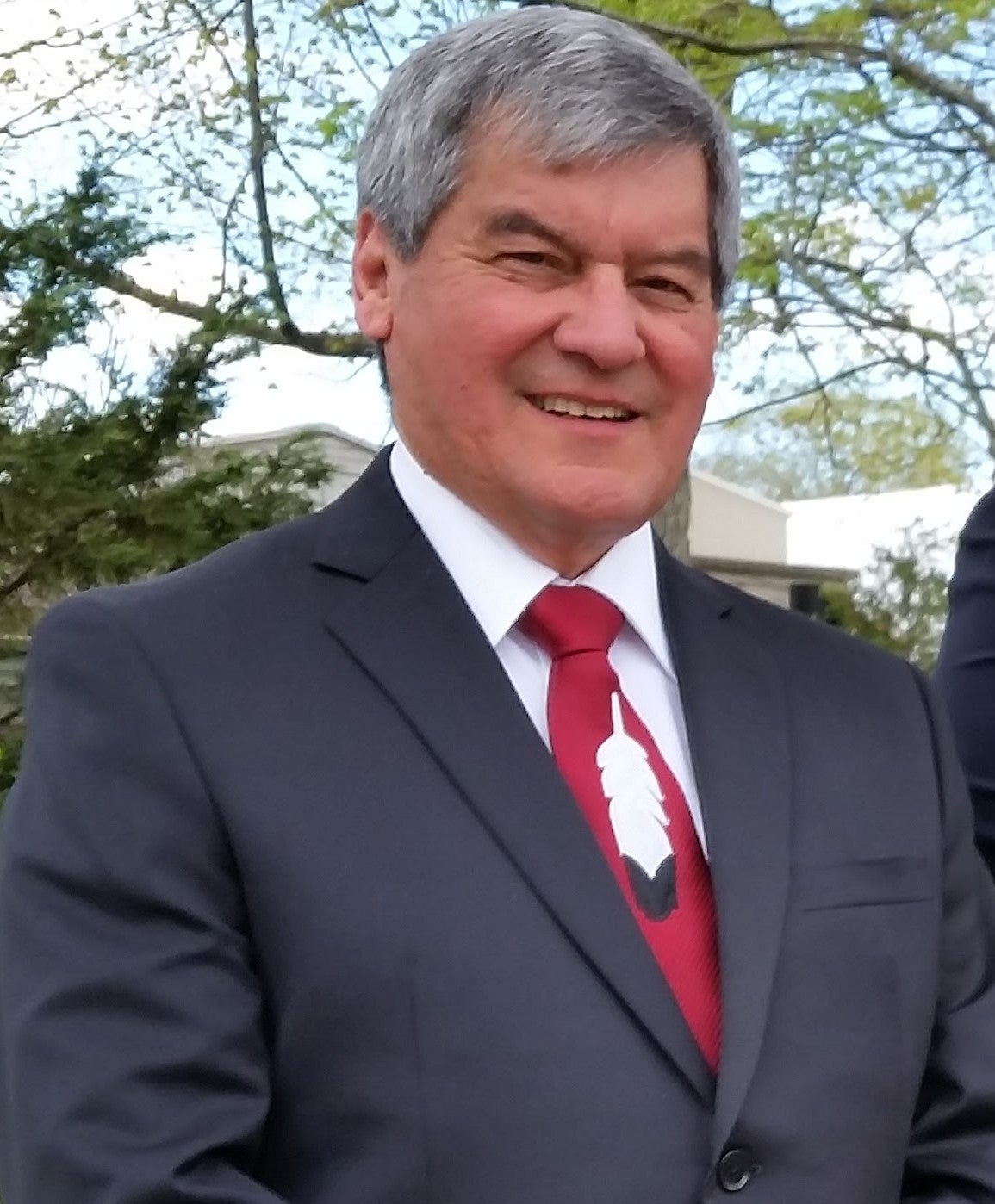 On Saturday, October 2, The Honourable Graydon Nicholas, a member of the Order of Canada, and current Endowed Chair of Native Studies at St. Thomas University, is the guest speaker at St. Jerome's University's annual Feast of St. Jerome student bursary fundraiser, offering his own reflections on the past and the route to reconciliation for Catholics.
On Saturday, October 2, The Honourable Graydon Nicholas, a member of the Order of Canada, and current Endowed Chair of Native Studies at St. Thomas University, is the guest speaker at St. Jerome's University's annual Feast of St. Jerome student bursary fundraiser, offering his own reflections on the past and the route to reconciliation for Catholics.
The MATES scavenger hunt event, which started on September 26, allows students new to campus to learn about different services/locations of campus and is scheduled to end on October 9. Students can participate both in-person and online.
The scavenger hunt is aimed at incoming students who will benefit from learning about various services and locations around campus. Students can get involved either in-person or online. There are tasks students have to complete in order to win prizes like a $25 Amazon Gift Card and assorted MATES swag, which are divided into an in-person version and an online-version. If they choose to do in-person, they can download the GooseChase app to take and submit pictures of the scavenger hunt hints they will find around campus. No hint ever requires a student to enter inside of a building for safety. If they choose to do the hunt online, they will be completing their tasks online via their personal devices, like PC or phone.
Link of the day
National Day for Truth and Reconciliation
When and Where to get support
Students can visit the Student Success Office online for supports including academic development, international student resources, leadership development, exchange and study abroad, and opportunities to get involved.
Instructors can visit the Keep Learning website to get support on adapting their teaching and learning plans for an online environment.
Course templates are available within your course in LEARN to help you build and edit your content and assignment pages quickly.
The following workshops, webinars, and events are offered by the KL team (CTE, CEL, ITMS, LIB):
- Independent Remote Course Design Essentials, self-directed, continuous self-enrollment course in LEARN.
- Independent Blended Course Design (iBlend), self-directed, ongoing
-
Thirty Minute Thursdays– PebblePad – Offered: September 30, October 7, October 21, October 28, November 11, November 18, November 25, 12:00 noon to 12: 30 p.m.
Employees can access resources to help them work remotely, including managing University records and privacy of personal information. Here are some tips for staying healthy while working from home.
Stay informed about COVID cases on campus by consulting the COVID case tracker.
The Writing and Communication Centre has virtual services and programs to help undergrads, grad students, postdocs and faculty members with academic writing.
- Meet with writing advisors in one-to-one appointments to brainstorm, draft, revise, and polish. No time for an appointment? Try email tutoring for undergrads.
- Beat isolation and make writing progress at weekly Virtual Writing Cafés for grad students and faculty or PJ-Friendly Writing Groups for Undergrads.
- Take an online workshop or apply to our popular Dissertation Boot Camp program.
- Faculty can request custom in-class workshops for their courses, or the WCC can facilitate any existing workshops for student groups.
Co-op students can get help finding a job and find supports to successfully work remotely, develop new skills, access wellness and career information, and contact a co-op or career advisor.
The Centre for Career Action (CCA) is offering some in-person services for fall 2021. The Tatham Centre is open with front-desk support, limited in-person appointments and co-op consults. Services are also available virtually. Book an appointment online or Live Chat with our Client Support Team. The CCA is here to help.
If you feel overwhelmed or anxious and need to talk to somebody, please contact the University’s Campus Wellness services, either Health Services or Counselling Services. You can also contact the University's Centre for Mental Health Research and Treatment. Good2Talk is a post-secondary student helpline available to all students.
While the Library continues to focus on digital resources and consultations, our spaces are open for the fall term. Dana Porter Library is open Monday to Friday, 9 a.m. to 5 p.m., and Davis Centre Library is open Monday to Friday, 9 a.m. to 11 p.m., and Saturday and Sunday, 11 a.m. to 5 p.m. for drop-in individual study space, bookable individual study rooms, drop-in access to computers and printers, book pick-up services and IST Help Desk support. Special Collections & Archives and the Geospatial Centre will be accessible by appointment. Library staff are available for questions via Ask us. Full details on current services and hours are available on the Library’s COVID-19 Update webpage.
The Faculty Association of the University of Waterloo (FAUW) continues to advocate for its members. Check out the FAUW blog for more information.
The University of Waterloo Staff Association (UWSA) continues to advocate for its members. Check out the UWSA blog for more information.
The Sexual Violence Prevention and Response Office (SVPRO) supports all members of the University of Waterloo campus community who have experienced, or been impacted, by sexual violence. This includes all students, staff, faculty and visitors on the main campus, the satellite campuses, and at the affiliated and federated Waterloo Institutes and Colleges. For support, email: svpro@uwaterloo.ca or visit the SVPRO website.
The Indigenous Initiatives Office is a central hub that provides guidance, support, and resources to all Indigenous and non-Indigenous campus community members and oversees the university Indigenization strategy.
The Waterloo Indigenous Student Centre, based at St. Paul’s University College, provides support and resources for Indigenous students, and educational outreach programs for the broader community, including lectures, and events.
WUSA supports for students:
Peer support - MATES, Glow Centre, RAISE, Women’s Centre - Visit https://wusa.ca/peersupport to book an appointment either in person or online for the Fall term!
Food Support Service food hampers are currently available from the Turnkey Desk 24/7 in the Student Life Centre. Drop off locations are also open again in SLC, DC, DP, SCH and all residences.
Co-op Connection all available online. Check https://wusa.ca for more details.
Centre for Academic Policy Support - CAPS is here to assist Waterloo undergraduates throughout their experience in navigating academic policy in the instances of filing petitions, grievances and appeals. Please contact them at caps@wusa.ca. More information is available.
WUSA Student Legal Protection Program- Seeking legal counsel can be intimidating, especially if it’s your first time facing a legal issue. The legal assistance helpline provides quick access to legal advice in any area of law, including criminal. Just call 1-833-202-4571.
Empower Me is a confidential mental health and wellness service that connects students with qualified counsellors 24/7. They can be reached at 1-833-628-5589.
When and Where (but mostly when)
Healthy Warriors at Home(Online Fitness)
Warrior Rec Registration. Starts September 7. A wide range of programs are being offered this term. Intramural deadline: September 13, 11:00 a.m. Instructional deadline: September 19, 11:59 p.m. Register online.
Warriors vs. Laurier Blood Donation Battle. Join your fellow Warriors, donate blood and help us win the Blood Battle against Laurier for a second year in a row. Set up a profile or add the PFL code: UNIV960995 to your account if you have a blood.ca account already. Questions? Contact WarriorsInfo@uwaterloo.ca.
Drop-in to Warrior Virtual Study Halls on Wednesdays from 5:30 p.m. to 7:00 p.m. Come together in this virtual space to set goals and work independently or in groups each week.
Renison English Language Institute continues to offer virtual events and workshops to help students practice their English language skills.
Fusion Conference 2021: Advances and Emerging Opportunities in Financial Technology registration deadline, Thursday, September 30.
Continuous Improvement and Change Management Community of Practice (CI&CM CoP) meeting, Thursday, September 30, 9:00 a.m. to 10:00 a.m. Register for this event.
“Remember Me, Remember Us” Community Walk hosted by Healing of the Seven Generations, Thursday, September 30, 10:00 a.m. Walk begins at 300 Frederick St. in Kitchener.
School of Planning - Virtual Induction Ceremony, Thursday, September 30, 6:00 p.m. to 7:30 p.m. via WebEx.
“A brief history of colonialism, intergenerational trauma, and genocide of Indigenous Peoples in Canada” with Dr. Michael Dan, Thursday, September 30, 7:00 p.m.
CrySP Speaker Series on Privacy, “Cybersecurity and the Protection of Dissent,” featuring Glencora Borradaile. Monday, October 4, 1:30 to 2:30 p.m.
WaterLeadership training seminar, “Knowledge Mobilization 101 for Water Researchers,” Tuesday, October 5, 1:00 p.m.
Beyond digital. Accelerate with the skills you need, Tuesday, October 5, 3:00 p.m.
President's Forum, Wednesday, October 6, 1:30 p.m.
NEW - Free webinar: Learn ways to manage stress in a changed world, Wednesday, October 6, 1:00 p.m. No registration required.
Safeguarding Science workshop– Waterloo faculty, staff, and students involved in research using biological, chemical, radiological, or nuclear materials or technology are invited to join Public Safety Canada on MS Teams, Wednesday, October 6, 1:30 p.m. to 3:45 p.m. Please register.